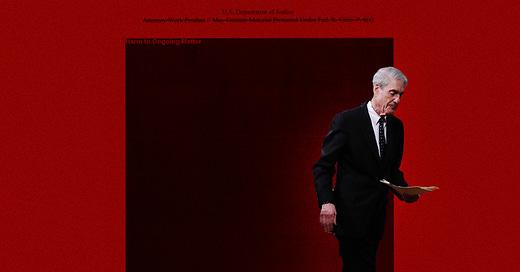The American Public Needs to Hear These 10 Things from Robert Mueller
His appearance before two House committees can clear up the waters that Bill Barr has muddied.
It’s a good thing for the American public and for American democracy that Special Counsel Robert Mueller will testify before the House Judiciary and Intelligence committees on July 17.
Predictably, Donald Trump amplified his tired wails of victimhood this week, while millions of Americans rolled weary eyes over all-things-Mueller investigation. A huge number of us will probably watch the coverage anyway. As we should.
The big themes are three-fold: The Russians attacked (and are still trying to attack) our core electoral process, the Trump campaign played a part in that process, and President Trump took steps to obstruct justice.
These basics are not legitimately debatable or ambiguous. Chapter and verse are in the Mueller report. The problem is that few Americans have actually read the report or even followed the narrative. America needs an explainer-in-chief. The reality that people can disagree on what to do next is really beside the point.
To that end, and as a professional legal educator, I would ask Robert Mueller these 10 core questions if given the chance:
What facts show that the Russian government engaged in criminal activity with respect to the 2016 U.S. presidential election? (Recall that Mueller issued two voluminous conspiracy indictments on this subject. They are well-worth a read.)
What facts, if any, show that the Russian government’s influence in the 2016 election had (or may have had) an adverse effect on the validity and weight of the millions of votes cast by individual Americans in the 2016 presidential election?
What facts, if any, show that the Russian government is continuing to engage in ongoing criminal activity in connection with the upcoming 2020 presidential elections?
In your professional judgment as a former FBI director, what steps must the United States take now to stop or minimize Russian interference in the 2020 presidential election?
What is the legal difference between conspiracy and collusion? (Barr has irresponsibly muddied the waters here. Collusion is not a legal concept, period.)
Why did you decline to reach a conclusion as to whether the Trump campaign colluded with Russia? (See above.)
Does the law require that a person actually obstruct an investigation in order for that person to be guilty of the crime of obstruction of justice? (Again, Barr has irresponsibly muddied the waters here. The clear answer is no.)
In your professional judgment, why does federal statutory law make it a crime to obstruct justice? (The goal of this one is to explain why we penalize obstruction of justice, i.e., it keeps the criminal justice process legitimate and fair for the rest of us.)
In your professional judgment, does Volume II of the report detail sufficient evidence of obstruction of justice to support an indictment by a grand jury and possible conviction of a private citizen for the crime of obstruction of justice? (This is a biggie.)
Was it ever your expectation that Congress would investigate matters addressed in the report as part of its routine oversight prerogative and/or as part of an impeachment process? (This question aims to educate people on how and why the Constitution tasks Congress with something called impeachment.)
These questions are by no means exhaustive. But remember: Former Deputy Attorney General Rod Rosenstein appointed Mueller to avoid the inherent conflict of interest that arises if an employee (the attorney general) is charged with investigating the boss (the president). Mueller has steadfastly maintained his neutrality and will no doubt insist on adhering to the facts and the law in his testimony on July 17. Attempts to politicize Mueller and his project are cynical—and silly.
Of course, a percentage of the population (hovering around 40 percent) will stand by the president and not care a whit what Mueller says. Support for Trump after July 17 is to be expected.
But utter nonchalance is dangerous. The office of the presidency must be kept in check, regardless of its current occupant, because presidents come and go. In the long run, it’s the integrity of the institution that matters.





